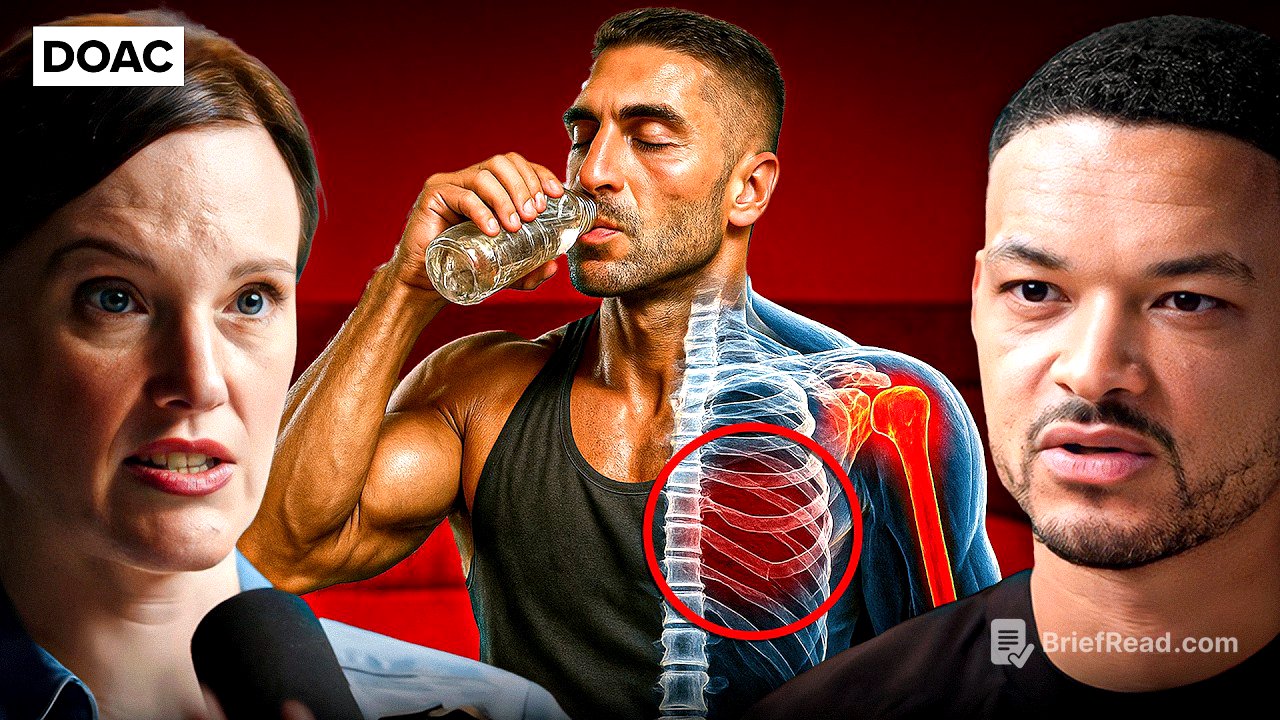TLDR;
This video discusses the importance of water quality, the impact of pollutants from plastics, and the significance of nutrient-dense foods for brain health. It also covers the role of supplements, particularly omega-3 fatty acids and antioxidants, and explores the evolutionary basis of menopause, highlighting the "grandmother hypothesis."
- Importance of clean water with electrolytes and minerals for hydration.
- Dangers of plastic contaminants in food and their impact on women's health.
- Brain's need for specific nutrients like antioxidants, lean protein, and polyunsaturated fatty acids.
- Supplements should complement a healthy diet, not replace it.
- Evolutionary perspective on menopause and the grandmother hypothesis.
Importance of Water Quality and Avoiding Plastics [0:00]
The discussion begins with the importance of drinking water, emphasizing that not all water is the same. Purified water lacks the necessary electrolytes and minerals that the brain needs for proper hydration. Tap water is acceptable if clean, and a whole-house filter can remove impurities while preserving electrolytes. The conversation shifts to the dangers of plastic, highlighting that it is a common contaminant. Heating plastic, especially in dishwashers, causes particles to leach into food and beverages.
The Impact of Pollutants on Women's Health [0:45]
Pollutants accumulate in the body through bioaccumulation, starting at low doses but piling up over time. This is particularly concerning for women due to their higher body fat percentage, where pollutants tend to accumulate, especially in breast tissue. These pollutants have been linked to reproductive issues like infertility, endometriosis, thyroid disease, dementia, and cancers. The strong association between pollutants and these health issues is a significant reason to avoid plastic.
Nutrient-Dense Foods for Brain Health [2:26]
The brain requires specific nutrients to function optimally, including potassium, sodium, magnesium, omega-3 fatty acids, protein, and glucose. These nutrients become part of the brain's structure, making it crucial to choose foods that support brain health. The brain is not a sponge, and consuming cholesterol-rich foods will not directly benefit it. Instead, focus on antioxidant-rich foods like fruits, veggies, nuts, and seeds, as well as lean protein and polyunsaturated fatty acids.
Supplements and the Mediterranean Diet [5:17]
A Mediterranean-style diet is associated with better health outcomes for women. Supplements should complement a healthy diet, not replace it, and are most effective when addressing deficiencies. High doses of supplements that the brain doesn't need are not beneficial. Omega-3 supplements may be helpful if dietary intake is insufficient, with the brain needing between three and six grams per day. Extracts and botanicals are also good sources of nutrients.
Legumes, Menopause, and Omega-3s [8:12]
A diet rich in legumes and fatty fish can delay the onset of menopause by up to three years, while a diet high in sugary beverages, processed foods, and packaged meats can lead to earlier menopause. Adequate omega-3 consumption is associated with lower risks of depression, better fertility, and gentler menopause. Antioxidants are linked to fewer menstrual cramps and a lower risk of premenstrual syndrome.
The Evolutionary Basis of Menopause: The Grandmother Hypothesis [9:56]
Menopause is a biological puzzle, as most animal species die shortly after their reproductive span ends. The grandmother hypothesis suggests that menopause evolved to allow women to remain alive and help their daughters, sons, and grandchildren. By providing resources and care, grandmothers ensure the survival and reproductive success of their descendants. This adaptation allows women to be productive and contribute to their families even after their reproductive years. The body remodels itself to adapt to menopause, suggesting an evolutionary adaptation.









![Baray Bhaiya Episode 74 - [Eng Sub] - Aijaz Aslam - Maya Khan - Rabya Kulsoom - 28th August 2025](https://wm-img.halpindev.com/p-briefread_c-10_b-10/urlb/aHR0cDovL2ltZy55b3V0dWJlLmNvbS92aS9vdHFoeWxDV01ERS9ocWRlZmF1bHQuanBn.jpg)